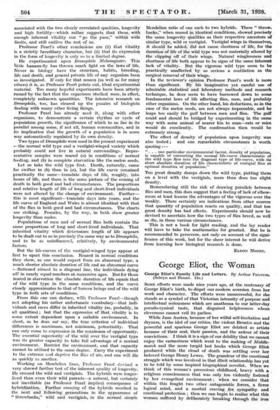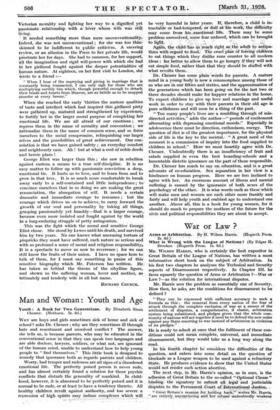George Eliot, the Woman George Eliot's Family Life and Letters.
By Arthur Paterson4 (Selwyn and Blount. 21s.) SOME efforts were made nine years ago, at the Centenary Of George Eliot's birth, to dispel our modern aversion from her work and character. The efforts were unsuccessful, for she stands as a symbol of that Victorian intensity of purpose and intellectual seriousness which are anathema to our latter-day pseudo-cynical taste, that disguised helplessness whose cleverness cannot veil its pathos.
While Jane Austen, because of her wilful self-limitation and dryness, is the idol of our critics, the violent Brontes and the powerful and spacious George Eliot are debited as artists because of their zeal, their passion, and the ardour of their convictions. I think it is a sign of our debility that we cannot enjoy the earnestness -which went to the making of Middle- march and the more turgid last books which George Eliot produced while. the cloud of death was settling over her beloved George Henry Lewes. The grandeur of the emotional struggle which was involved in that illicit relationship has yet to be told by some inspired biographical novelist. When we think of this woman's precocious_ childhood, heavy with a . religious consciousness that was only too violently fostered by her evangelical environment ; when we consider that within this fought two other antagonistic forces, a fierce logical mind, and a morbid craving :for- sympathy and emotional protection ; then we can begin to realize what this woman suffered by deliberately-breaking through the iron
Victorian morality and fighting her way to a_ dignified yet paisioluitejfelaticinship _With a loVer whose wife was still • It needed something more than mere .unconventionality. Indeed, she was not unconventional ; fOr she was too thin. skinned to be indifferent to public criticism. A sneering review, or an allusion in the Press to her private life, would prostrate her for days. She had to summon, for her support, all the imagination and rigid will-power with which she had in her girlhood fought against the deeper potentialities of taiiman nature. At eighteen,' on her first visit to London, she erote to a friend
" When I hear of the marrying and giving in marriage that is constantly being traniacted, can only sigh for thole who are Multiplying earthly ties 'Which, though powerful enough to detach their heads and hearts frcim Heaven, are so brittle as to be snapped asunder at every breeze."
When she reached the early 'thirties the austere qualities Of taste and intellect which had inspired this :girlhood piety Were gathered up, matured and strengthened by experience; Lb fortify hei in the larger moral purpose -Of conipleting her emotional life. We are all afraid of our emotions ; we' repress them in the name of morality and convention ; we rationalize them in the name of common sense, and so force ourselves to the. sOcial compromise, relinquishing' our larger Selves and the possibilities of great achievement. Our con . sOlatioa is that we haire gained safety;*.an eVeryday)2Omfort,
and neighbourly ease.. Ah ! but at what a cost of noble deedi and heroic plans !
George Eliot was larger than this ; she saw in rebellion - against custom a means to a true self-discipline. It is no easy Matter to follow up with passionate conviction a deep, emotional tie. It hurts us to love, and to learn from and to grow in that love. It is so much more comfortable to:break away early to a self-contained and little independence ; convince ourselves that in so doing we are making the great renunciation, the abnegation of self. It needs a certain
dramatic and immediate 'courage- to • -renounce ; but the courage which drives us on to achieve, to carry forward the growth of our soul and personality by taking all thingi,
grasping passionately yet humbly—that is a larger courage,: beeause even more • isolated and fought against by the world in a long-enduring struggle of petty antagonism. _
This was the fight which the moral and sensitive George Eliot chose. She stood by Leives until his death, andsurvived- him by two years. No one knoivs what unceasing torture of pinpricks they must have suffered, each nature so serious and with so profound a sense of moral and religious responsibility. It is a spectacle to move us now- to reverence; for we can' still knevi the fruits of their union. I have nix Space here to talk of them, for I must say something in praise of this Sensitive biography which Mr. --Paterson has written. He has taken us behind the throne of • the sibylline figure, and shown us the suffering woman, lover and mother, so. intimately and tenderly wife in all but name.
RICHAIW CHURCH.



































 Previous page
Previous page